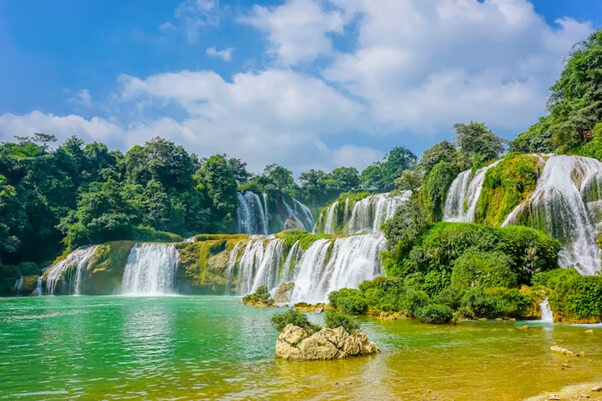Updated February 13, 2023
Impact of Nature

In its broadest sense, nature refers to the physical world around us and its components, including the atmosphere, oceans, landforms, and wildlife. It encompasses the diversity of flora and fauna, geological features, and the intricacies of weather patterns. In its most basic form, nature can be a vast and interconnected network of living and non-living elements that support and sustain each other. As a result, nature has been a critical factor in shaping human civilizations throughout history and continues to play an essential role in our lives today. Let’s look at the other details in Essay on Nature.
Essay on Nature
Nature is a source of inspiration and awe for human beings. It encompasses the diversity of flora and fauna, geological features, and the intricacies of weather patterns and has been a critical factor in shaping human civilizations throughout history. In addition to its spiritual significance, nature has practical value as a source of food, medicine, and materials. As a result, nature has been instrumental in human survival and progress, providing us with the essential resources we need to thrive.
Moreover, spending time in natural environments has impacted human health profoundly. Let’s look at a few more details in Essay on Nature.
Nature’s Role in Physical and Mental Health
Nature is also known to impact human health profoundly. Studies have shown that spending time in natural environments can help reduce stress levels, lower blood pressure, and improve overall well-being. Exposure to natural light, fresh air, and greenery was also linked to improved mental health, reducing symptoms of depression and anxiety. Moreover, research has indicated that exposure to nature can enhance cognitive functioning and creativity, making it an essential component of a healthy and well-rounded life.
Nature’s Relationship with Human Civilization
Humans have always had a complex relationship with nature. Humans have relied on the natural world for food, shelter, and resources for thousands of years, and our civilizations have been deeply entwined with the environment. However, with the growth of industrialization, the strain on the environment has become increasingly significant. Natural systems are also altered, and many species have become endangered, leading to a decline in biodiversity and environmental degradation. We must take steps to protect and conserve nature for future generations.
Conserving Nature for Future Generations
As the impact of human activities on the environment continues to grow, it is becoming increasingly essential to protect and conserve nature. This includes preserving natural habitats, protecting endangered species, and reducing our use of natural resources. Conservation efforts must balance the need for economic growth and development with the importance of preserving the environment for future generations. This requires a collective effort from individuals, communities, and governments to implement sustainable practices and minimize our environmental impact.
The Importance of Environmental Education
To preserve and protect nature for future generations, we must educate people about the environment and the importance of conservation. Environmental education is then integrated into school curricula and accessible to people of all ages and backgrounds. It should focus on scientific facts and ecological issues and encourage individuals to develop a personal connection with nature and appreciate its beauty and significance. This includes learning about the intricacies of natural systems, understanding the impact of human activities on the environment, and developing a sense of environmental responsibility.
Challenges Faced by Nature
Nature faces many challenges due to human activities, including deforestation, pollution, and the over-exploitation of natural resources. Climate change is a growing threat, with rising temperatures causing melting glaciers, rising sea levels, and shifts in weather patterns that can be devastating to wildlife and habitats. The loss of biodiversity is also a significant concern, with many species becoming endangered and at risk of extinction.
Another challenge is the fragmentation of habitats, which results in the decline of species and ecosystems. This fragmentation occurs as natural habitats become destroyed to make way for human development, reducing the available space for wildlife and altering ecosystems. The introduction of invasive species can also have a significant impact, altering ecosystems and out-competing native species, leading to a decline in biodiversity.
In addition to the environmental challenges, there are also economic and social challenges to preserving nature. Exploiting natural resources for financial gain can lead to overuse and degradation, making it challenging to balance conservation efforts with economic development. There is also a lack of political will to implement conservation measures and enforce environmental laws, leading to a lack of progress in protecting nature.
Conclusion
This article, Essay on Nature is a helpful resource for students. Nature is a precious resource essential in shaping human civilizations and sustaining human life. Its practical value as a source of food, medicine, and materials had combined with its impact on human health and well-being. However, the growth of human activities has put increasing strain on the environment, making it imperative that we take steps to protect and conserve nature for future generations. Environmental education is a critical component of this effort, and individuals of all ages and backgrounds are also encouraged to develop a sense of environmental responsibility and an appreciation for the beauty and significance of nature.
